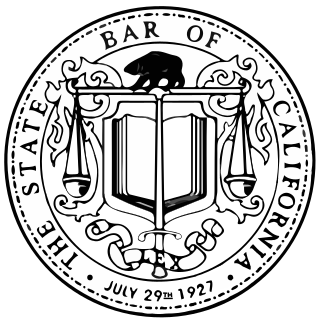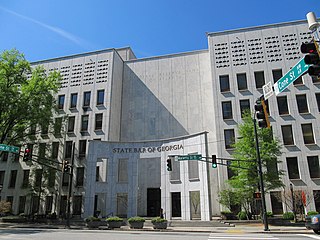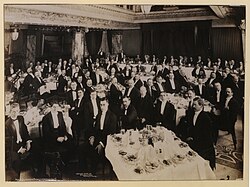A bar association is a professional association of lawyers as generally organized in countries following the Anglo-American types of jurisprudence. The word bar is derived from the old English/European custom of using a physical railing to separate the area in which court business is done from the viewing area for the general public.

A paralegal, also known as a legal assistant, or paralegal specialist is a legal professional who performs tasks that require knowledge of legal concepts but not the full expertise of a lawyer with an admission to practice law. The market for paralegals is broad, including consultancies, companies that have legal departments or that perform legislative and regulatory compliance activities in areas such as environment, labor, intellectual property, zoning, and tax. Legal offices and public bodies also have many paralegals in support activities using other titles outside of the standard titles used in the profession. There is a diverse array of work experiences attainable within the paralegal field, ranging between internship, entry-level, associate, junior, mid-senior, and senior level positions.

The American Bar Association (ABA) is a voluntary bar association of lawyers and law students; it is not specific to any jurisdiction in the United States. Founded in 1878, the ABA's stated activities are the setting of academic standards for law schools, and the formulation of model ethical codes related to the legal profession. As of fiscal year 2017, the ABA had 194,000 dues-paying members, constituting approximately 14.4% of American attorneys. In 1979, half of all lawyers in the U.S. were members of the ABA. The organization's national headquarters are in Chicago, Illinois, and it also maintains a significant branch office in Washington, D.C.

The State Bar of California is an administrative division of the Supreme Court of California which licenses attorneys and regulates the practice of law in California. It is responsible for managing the admission of lawyers to the practice of law, investigating complaints of professional misconduct, prescribing appropriate discipline, accepting attorney-member fees, and financially distributing sums paid through attorney trust accounts to fund nonprofit legal entities. It is directly responsible to the Supreme Court of California; however, its trustees are now appointed by the Supreme Court, the California Legislature, and Governor of California. All attorney admissions are issued as recommendations of the State Bar, which are then routinely ratified by the Supreme Court. Attorney discipline is handled by the State Bar Office of Chief Trial Counsel, which acts as prosecutor before the State Bar Court of California. The State Bar has been cited for its corrupt practices during the 21st century, and is subject to reforms issued by its governing body, the California Supreme Court.

The New Zealand Law Society is the parent body for barristers and solicitors in New Zealand. It was established in 1869, and regulates all lawyers practising in New Zealand. Membership of the society is voluntary, although any person wishing to practice law in New Zealand must obtain a practising certificate from the society. The society has 13 branch offices throughout the country. Each branch has a president and a council, which represent their members’ interests on a regional and national level.
The Federal Bar Association (FBA) is the primary voluntary professional organization for private and government lawyers and judges practicing and sitting in federal courts in the United States. Six times a year, the FBA prints The Federal Lawyer, which includes the latest news of interest to the federal legal community. The magazine features articles by attorneys and judges, book reviews, the latest Supreme Court rulings, judicial profiles, and thorough coverage of FBA activities.
The State Bar of Arizona is the integrated (mandatory) bar association of the U.S. state of Arizona. The Arizona Supreme Court licenses lawyers, while the State Bar administers the regulation of the practice of law. The State Bar, under the direction of the Court, establishes procedures for the discipline of lawyer misconduct and provides education and development programs for the legal profession and the public. Through the Rules of The Supreme Court of Arizona, the privilege to practice law in Arizona is granted solely to "active member[s] of the state bar."

The State Bar of Georgia is the governing body of the legal profession in the State of Georgia, operating under the supervision of the Supreme Court of Georgia. Membership is a condition of admission to practice law in Georgia.

The Law Society of Alberta (LSA) is the self-regulating body for lawyers in Alberta, Canada, established in 1907 which derives its authority from the Legal Profession Act of the Government of Alberta.

The Alabama State Bar is the integrated (mandatory) bar association of the U.S. state of Alabama.
The Manitoba Bar Association (MBA) is an organization of members of the legal profession in Manitoba, Canada. It is a non-profit professional association, and is a branch of the Canadian Bar Association. As of 2021, the MBA represents approximately 1,400 members from across the province, including lawyers, judges, notaries, law teachers, and law students.
The New York County Lawyers Association (NYCLA) is a bar association located in New York City.
The Alaska Bar Association is a mandatory bar association responsible for the Alaska Supreme Court and for the admission and discipline process of attorneys for the state of Alaska.
The Ontario Bar Association is a bar association representing more than 16,000 lawyers, judges, notaries, law teachers, and law students from across Ontario. It is also a branch of the Canadian Bar Association. Approximately two-thirds of all practicing lawyers in Canada belong to the CBA.
The North Carolina Bar Association (NCBA) is the voluntary (non-mandatory) bar association of the U.S. state of North Carolina. NCBA membership is voluntary and tax money is not involved in its support. In contrast, the North Carolina State Bar and the North Carolina Board of Law Examiners are state agencies.
The German Bar Association is a voluntary association of German and German-speaking lawyers. It seeks to safeguard, protect and promote the professional and economic interests of the Bar, notary lawyers included, especially by promoting fair administration of justice and legislation, education and further training, encouragement of professional solidarity and scientific spirit among lawyers.
Irwin Dorfman,, was a Canadian lawyer from Winnipeg, Manitoba, eventually becoming senior counsel with the firm of Thompson Dorfman Sweatman. In addition to a busy legal practice in the areas of taxation and corporate matters, he was active in his community and in the profession. He served as president of the Law Society of Manitoba and as the national president of the Canadian Bar Association, the first Jewish president in the Association's history.
Jacques Viau was a Canadian lawyer practising in Montreal, Quebec. He served as bâtonnier of the Barreau du Québec and the Bar of Montreal. He also served as president of the Canadian Bar Association from 1977 to 1978. During his term in office, he chaired a committee which produced a major set of recommendations for reform of the Constitution of Canada.
Thomas Joseph Walsh was a Canadian lawyer, practising in Calgary, Alberta. In addition to a busy legal practice, he was very active in his community and profession, including serving a term as national president of the Canadian Bar Association. His community involvement was recognised by his appointment to the Order of Canada and to the Alberta Order of Excellence.
J. Patrick Peacock was a Canadian lawyer in Calgary, Alberta. He specialized in litigation and was very active in the legal profession. He was the national president of the Canadian Bar Association from 1988 to 1989. He was also the president of the Calgary Stampeders in the Canadian Football League from 1985 to 1986.








